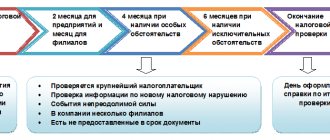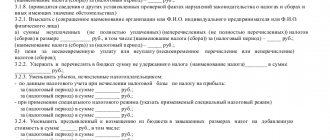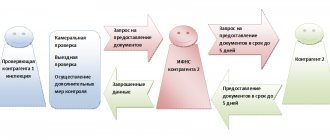Certificate of completion of verification
On the last day of the on-site tax audit, the head of the inspection team draws up a certificate in the form approved by Order of the Federal Tax Service of Russia dated May 31, 2007 No. MM-3-06/338 (clause 15 of Article 89 of the Tax Code of the Russian Federation).
The certificate must indicate:
- place and date of compilation;
- details of the decision to schedule an on-site inspection;
- full and abbreviated name of the organization in which the inspection was carried out, its tax identification number and checkpoint;
- subject of the audit (types of taxes being audited, the period covered by the audit);
- period of inspection.
If the inspection was carried out at a member of the consolidated group, then the certificate also indicates:
- TIN, KPP of a consolidated group of taxpayers with the date and registration number of the agreement on its creation;
- full and abbreviated name of the responsible participant in the consolidated group of taxpayers, his INN, KPP;
- full and abbreviated names of other participants in the consolidated group of taxpayers, their Taxpayer Identification Number (TIN) and KPP.
This follows from paragraph 11 of Article 89 of the Tax Code of the Russian Federation and Appendix 2 to the order of the Federal Tax Service of Russia dated May 31, 2007 No. MM-3-06/338.
The preparation of a certificate indicates the completion of the inspection (clause 8 of Article 89 of the Tax Code of the Russian Federation). From the date of preparation of the certificate, the deadlines for further processing of the results of the tax audit begin. After drawing up the certificate, representatives of the tax inspectorate do not have the right to be on the territory of the organization, request documents or carry out any tax control activities. Such clarifications are contained in paragraph 3 of the letter of the Federal Tax Service of Russia dated December 29, 2012 No. AS-4-2/22690.
Should the tax authority make a decision directly on the day of consideration of the audit materials?
There is no such obligation. The tax authority is not obliged to make a decision directly on the day of consideration of the audit materials (Resolution of the Presidium of the Supreme Arbitration Court of the Russian Federation dated March 17, 2009 No. 14645/08). Moreover, notification of the time and place of the actual signing of the decision is also not provided. The taxpayer will receive an already signed decision.
From June 2, 2021, a decision based on the results of consideration of audit materials in a situation where additional tax control measures were taken must be made within 10 days from the date of expiration of the deadline for the taxpayer to submit objections to the materials of additional measures. The Tax Code of the Russian Federation does not provide for an extension of the deadline for making a decision. The duration of this period does not depend on whether the taxpayer submitted an application to familiarize himself with the materials or not. Missing the deadline for making a decision does not entail its invalidity.
Presentation of certificate
Inspectors must hand over the certificate of the inspection to the legal or authorized representative of the organization on the day of preparation (i.e., on the last day of the inspection) (paragraph 1, clause 15, article 89 of the Tax Code of the Russian Federation). In this case, the authorized representative must have a power of attorney to represent the interests of the organization in the tax inspectorates.
The certificate form provides a field in which the representative of the organization must mark the receipt of the certificate. If a representative of an organization avoids receiving a certificate, the inspection will send it to the organization by registered mail (paragraph 2, clause 15, article 89 of the Tax Code of the Russian Federation). In this case, the date of receipt of the certificate will be considered the date indicated on the calendar stamp imprint of the postal notification of delivery of the letter (clause 3 of the letter of the Federal Tax Service of Russia dated December 29, 2012 No. AS-4-2/22690).
In addition, the certificate can be transmitted to the organization via telecommunication channels. The procedure for electronic document flow between tax inspectorates and taxpayers was approved by Order of the Federal Tax Service of Russia dated April 15, 2015 No. ММВ-7-2/149. An electronic certificate will be considered received when the inspection receives an electronic receipt for the receipt of this document. If the inspection does not receive such a receipt, it will send a certificate on paper in accordance with the generally established procedure. This conclusion follows from the provisions of paragraphs 12, 16 and 19 of the Procedure, approved by order of the Federal Tax Service of Russia dated April 15, 2015 No. ММВ-7-2/149.
Situation: can the inspection, instead of the original, give the organization a copy of the certificate of the on-site inspection?
Answer: yes, it can.
On the last day of the on-site tax audit, the head of the inspection team draws up a certificate and hands it to the organization’s representative. This procedure is provided for in paragraph 15 of Article 89 of the Tax Code of the Russian Federation. The provisions of this norm do not determine in what form (original or copy) the certificate must be transferred to the organization. Therefore, the inspection has the right to give the organization a copy of the certificate and keep the original. In arbitration practice there are examples of court decisions that confirm the legitimacy of this conclusion (see, for example, the decision of the Seventh Arbitration Court of Appeal dated November 10, 2008 No. 07AP-6276/08).
Situation: is it possible to cancel a decision based on the results of an on-site inspection if the inspection did not provide the organization with a certificate of inspection?
Answer: no, you can't.
The decision based on the results of a tax audit is subject to cancellation if the inspection violates the essential conditions of the procedure for considering audit materials. In particular, such a decision is canceled if the inspection does not provide the organization with the opportunity to participate in the consideration of the inspection materials and provide explanations on them. This is stated in paragraph 2 of paragraph 14 of Article 101 of the Tax Code of the Russian Federation. In addition, other violations related to the procedure for reviewing materials that could lead to the adoption of an incorrect decision (paragraph 3, paragraph 14, article 101 of the Tax Code of the Russian Federation) may become grounds for canceling the inspection decision.
The fact that the inspection did not transfer the certificate to the organization does not affect the procedure for considering tax audit materials. Consequently, such a violation in itself cannot become a basis for canceling the decision based on the results of the on-site inspection. In arbitration practice there are examples of court decisions that confirm the legitimacy of such a conclusion (see, for example, the resolution of the Ninth Arbitration Court of Appeal dated October 16, 2008 No. 09AP-11298/2008-AK).
Has the procedure for submitting objections to materials from additional measures changed?
The amendments introduce a new procedure - the procedure for filing written objections to the results of additional tax control measures.
Let me remind you that the period for carrying out additional measures, as a general rule, is one month and is indicated in the relevant decision. From the date of expiration of this period, the deadline for the taxpayer to submit objections begins to run, which is 10 working days.
Therefore, on the one hand, failure to submit an application for familiarization with the materials essentially deprives the taxpayer of the opportunity to submit objections to them in a separate procedure. On the other hand, if for some reason the taxpayer did not take the initiative to submit an application, he will be able to gain access to the materials of additional tax control measures by participating in the consideration of the audit materials by the tax authority and submitting explanations at this stage (clause 4 of Article 101 of the Tax Code of the Russian Federation ).
Checking act
No later than two months from the date of registration of the certificate, the inspectors draw up an on-site tax audit report (paragraph 1, clause 1, article 100 of the Tax Code of the Russian Federation). Its form was approved by order of the Federal Tax Service of Russia dated December 25, 2006 No. SAE-3-06/892. Inspectors must draw up an act, even if the results of the inspection did not reveal any violations (paragraph 1, paragraph 1, article 100 of the Tax Code of the Russian Federation, letter of the Federal Tax Service of Russia dated April 16, 2009 No. ШТ-22-2/299). In this case, the inspectors indicate in the report that there are no violations of tax legislation (subclause 12, clause 3, article 100 of the Tax Code of the Russian Federation).
Tax legislation establishes clear requirements for the execution of an on-site inspection report (clauses 3, 3.1, 4 of Article 100 of the Tax Code of the Russian Federation, Requirements approved by order of the Federal Tax Service of Russia dated December 25, 2006 No. SAE-3-06/892). For more information about what information inspectors must include in the inspection report, see the table.
If, when preparing an inspection report, the inspectorate has doubts about the interpretation of the legislation, the draft act can be sent for preliminary approval to the regional tax department. For example, this is possible if there are no official explanations from the Federal Tax Service of Russia on some issues or if these explanations do not coincide with the position of the Ministry of Finance of Russia. The deadlines for approval of draft inspection reports are set by the regional Federal Tax Service. However, these deadlines should not increase the total duration of preparation of the act (two months) established by paragraph 1 of paragraph 1 of Article 100 of the Tax Code of the Russian Federation. This follows from the provisions of Section II of the Procedure, approved by Order of the Federal Tax Service of Russia dated October 17, 2013 No. ММВ-7-3/449.
Situation: is it possible to cancel the inspection decision made based on the results of an on-site inspection? The inspection drew up an on-site inspection report containing violations (errors).
It is possible if violations committed during the preparation of the report led to the adoption of an incorrect decision based on the results of the on-site inspection.
The decision on a tax audit is subject to cancellation if the inspection violates the essential conditions of the procedure for considering audit materials. Thus, the inspection decision is canceled if the inspection does not provide the organization with the opportunity to participate in the consideration of the inspection materials and provide explanations on them. This is stated in paragraph 2 of paragraph 14 of Article 101 of the Tax Code of the Russian Federation. In addition, other violations related to the procedure for reviewing materials that could lead to the adoption of an incorrect decision (paragraph 3, paragraph 14, article 101 of the Tax Code of the Russian Federation) may become grounds for canceling the inspection decision.
The on-site audit report is one of the main materials of the tax audit, after consideration of which the inspectorate makes a final decision based on the results of the audit (clause 1 of Article 101 of the Tax Code of the Russian Federation). Consequently, violations committed by the inspectorate when drawing up the report may become the basis for making an incorrect decision based on the results of the on-site inspection. In this case, the inspection decision is subject to cancellation in full or in part related to the violation. In arbitration practice, there are court decisions that confirm the legitimacy of this conclusion. Thus, the inspection decision made based on the results of an on-site inspection can be canceled (in whole or in part) if the inspection made the following violations (errors) when drawing up the report:
- incorrectly applied the legislation and made incorrect conclusions, which were reflected in the final decision (see, for example, the decision of the Supreme Arbitration Court of the Russian Federation dated October 6, 2009 No. VAS-12395/09, resolution of the Federal Antimonopoly Service of the West Siberian District dated June 3, 2009 No. F04-3218/2009(7668-A46-26), F04-3218/2009(8926-A46-26), Moscow District dated September 29, 2009 No. KA-A40/6946-09);
- distorted the facts established during the audit (see, for example, resolution of the Federal Antimonopoly Service of the Ural District dated November 25, 2009 No. F09-9205/09-S2);
- assessed additional taxes, penalties and fines for periods that could not be covered by the on-site inspection (see, for example, the resolution of the Federal Antimonopoly Service of the Far Eastern District dated February 20, 2008 No. F03-A73/08-2/126);
- did not substantiate the fact of a tax offense and held the organization accountable for committing it (see, for example, the determination of the Supreme Arbitration Court of the Russian Federation dated June 4, 2009 No. VAS-6861/09, resolution of the Federal Antimonopoly Service of the East Siberian District dated February 10, 2009 No. A33- 6906/07-F02-15/09, Central District dated January 21, 2010 No. A35-1157/08-C15, dated November 30, 2009 No. A64-3933/07-16, Volga-Vyatka District dated December 21, 2009 No. A82-9362/2008, Volga District dated November 24, 2009 No. A72-2919/2009, West Siberian District dated September 9, 2009 No. F04-5332/2009(18985-A03-34), Moscow District dated April 6, 2009 No. KA-A40/2403-09, dated January 20, 2009 No. KA-A40/11945-08, Northwestern District dated May 4, 2009 No. A56-13415/2006, Ural District dated August 28, 2008 No. Ф09-6143/08-С3).
As a general rule, the on-site tax audit report is drawn up in two copies: one for the inspection, the second for the organization. When conducting a joint tax audit, the act is drawn up in three copies: the third copy is transferred by the inspectorate to the internal affairs bodies. When conducting a repeated on-site inspection in order to monitor the activities of a lower inspection, the report is also drawn up in triplicate. In this case, the higher tax authority that conducted the audit will send the third copy of the report to the inspectorate. This is stated in paragraph 9 of the Requirements approved by order of the Federal Tax Service of Russia dated December 25, 2006 No. SAE-3-06/892.
Can the act be signed by a tax authority official who did not participate in the audit?
Maybe. According to Resolution of the Presidium of the Supreme Arbitration Court of the Russian Federation dated January 24, 2012 No. 12181/11, the mere fact of signing a tax audit report by a person who did not conduct the audit does not indicate a significant violation of the rights of the taxpayer being audited. The taxpayer must indicate what the violation of his rights was (this may, in particular, be obstacles to the right to file objections or provide explanations).
Another situation occurs when a tax audit report, for example, due to the absence of a tax official from the workplace, is signed for him by another official. An act signed with a falsified signature is not adequate evidence and cannot form the basis of a decision to hold a taxpayer liable for taxation, regardless of whether it led or did not lead to the adoption of an essentially incorrect decision (Resolution of the Volga Region Autonomous District Court dated April 29, 2015 No. F06- 23225/2015).
Delivery of the act
The inspection must give the organization its copy of the act within five working days from the date of signing the act (clause 5 of article 100, clause 6 of article 6.1 of the Tax Code of the Russian Federation).
The inspection can hand over the act:
- personally to the legal or authorized representative of the organization against signature. In this case, the authorized representative must have a power of attorney to represent the interests of the organization in the tax inspectorates;
- in another way indicating the date of receipt of the act by the organization (for example, through a courier service).
This follows from paragraph 5 of Article 100 of the Tax Code of the Russian Federation.
Upon receipt of the act, the representative of the organization must put two signatures on it:
- on receipt of the act (clause 5 of article 100 of the Tax Code of the Russian Federation);
- about familiarization with the contents of the act. If a representative of the organization refuses to sign the act (for example, due to his incompetence), then the corresponding note about the refusal to sign will be made in the act (clause 2 of Article 100 of the Tax Code of the Russian Federation).
Situation: to whom is the tax audit report handed over: the head office of the organization or its branches? The on-site tax audit was carried out simultaneously in relation to the head office of the organization and its branches.
When simultaneously inspecting the head office of an organization and its branches, the head office of the organization receives an on-site tax audit report.
Within five working days from the date of drawing up, the tax audit report must be sent to the organization in respect of which the audit was carried out, or handed over to its representative (clause 5 of Article 100 of the Tax Code of the Russian Federation). The document is drawn up in accordance with the order of the Federal Tax Service of Russia dated December 25, 2006 No. SAE-3-06/892.
The results of the branch inspection are documented by filling out the relevant sections of the single inspection report. After reading them, the relevant section of the act is signed by the head of the branch. This is stated in the Requirements approved by order of the Federal Tax Service of Russia dated December 25, 2006 No. SAE-3-06/892. At the same time, the order of the Federal Tax Service of Russia dated December 25, 2006 No. SAE-3-06/892 does not provide for the delivery of individual parts of the act (sections) to the branch of the organization. Therefore, a single inspection report is handed over to a representative of the organization’s head office (sent to the organization).
At the same time, the head office of the organization has the right to send to its branches extracts from the inspection report (copies of sections of the report) relating to its branches.
Similar explanations are contained in letters of the Ministry of Finance of Russia dated September 10, 2007 No. 03-02-07/1-406, Federal Tax Service of Russia dated March 19, 2007 No. CHD-6-23/216.
Where can I find a completed sample GNP act?
You can familiarize yourself with the completed sample of the on-site tax audit report by downloading it from the link: Sample of the on-site tax audit report.
The GNP act consists of 3 mandatory parts (clause 3 of Appendix 24).
The introductory part contains the following information:
| date |
|
| Number |
|
| Name |
|
| Address |
|
| Scroll |
|
IMPORTANT! Failure to provide required information may result in the GNP results being contested. For example, in case No. A56-64382/2016, the arbitration court found the registration of the results of an on-site tax audit to be improper, which resulted in the failure to indicate the list of documents submitted by the taxpayer (resolution of the 13th AAS dated December 27, 2017).
You can find more complete information on the topic in ConsultantPlus. Free trial access to the system for 2 days.
Sending the act by mail
If an organization (its representative) avoids receiving an on-site inspection report, the inspection reflects this fact in the report and sends it by registered mail to the location of the organization (separate unit). In this case, the date of receipt of the act is considered to be the sixth working day from the date of sending the registered letter. This follows from the provisions of paragraph 2 of paragraph 5 of Article 100 and paragraph 6 of Article 6.1 of the Tax Code of the Russian Federation. Moreover, the countdown of the six-day period begins from the day following the day of sending the act (clause 2 of article 6.1 of the Tax Code of the Russian Federation).
Situation: does the inspection have the right to transfer a tax audit report (desk, field) by registered mail (by mail), if the organization does not evade receiving it?
The inspectorate may send a tax audit report by registered mail. But the date of its receipt will be considered the sixth working day from the date of sending the registered letter only if the organization evaded receiving the act. If the organization did not evade receiving the act, then the day of its delivery should be considered the day the organization actually received the registered letter.
This conclusion follows based on the totality of the following norms.
Tax legislation indicates that the inspectorate has the right to transfer a tax audit report in person against a signature or in other ways indicating the date of receipt of the report by the organization. This is stated in paragraph 1 of paragraph 5 of Article 100 of the Tax Code of the Russian Federation. Consequently, sending the act by registered mail is not a violation of the law on the part of the inspectorate, since this method of transmission allows one to reliably determine the date of actual receipt of the act by the organization.
At the same time, the legislation specifies that the inspectorate has the right to send a tax audit report by registered mail only if the organization avoids receiving it. In this case, the date of receipt of the act by the organization is considered to be the sixth working day from the date of sending the registered letter. This follows from the provisions of paragraph 2 of paragraph 5 of Article 100 and paragraph 6 of Article 6.1 of the Tax Code of the Russian Federation. Moreover, the countdown of the six-day period begins from the day following the day of sending the act (clause 2 of article 6.1 of the Tax Code of the Russian Federation).
The regulatory agencies did not express an official point of view on this matter. But in arbitration practice there are court decisions that confirm the legitimacy of this conclusion (see, for example, Resolution of the FAS of the Volga District dated December 17, 2009 No. A55-5813/2009).
Situation: to what address of the organization - legal or actual - should the inspection send a registered letter with a tax audit report (office, on-site)?
The inspectorate must send a registered letter with a tax audit report to the location of the organization, that is, to its legal address, which is indicated in the Unified State Register of Legal Entities (clause 5 of Article 31, clause 5 of Article 100 of the Tax Code of the Russian Federation). Similar explanations are contained in paragraph 1 of the letter of the Federal Tax Service of Russia dated September 20, 2013 No. AS-4-2/16981.
Situation: is the inspection obliged to attach to the report handed over to the organization evidence of violations that were identified during a tax audit (on-site, office)?
If documents received from the organization being inspected serve as evidence of a violation, then the inspectorate is not obliged to attach such evidence to the inspection report.
In this case, the following features must be taken into account.
If evidence of a violation is provided by documents received from other sources (for example, documents from counterparties, protocols for interviewing witnesses), then the inspectorate must attach such evidence to the tax audit report. This obligation remains even if information received from third parties:
- constitute a banking, tax or other secret protected by law (for example, commercial);
- contain personal data of citizens.
In these cases, not complete copies of documents, but extracts from them certified by the inspectorate should be attached to the tax audit report.
This procedure is established by paragraph 3.1 of Article 100 of the Tax Code of the Russian Federation, paragraph 1.13 of Appendix 6 to the order of the Federal Tax Service of Russia dated December 25, 2006 No. SAE-3-06/892.
Could the situation of the taxpayer under audit worsen as a result of additional measures?
Additional measures can only be taken in relation to violations of tax legislation already established in the act. They are not intended to collect information about violations that are not reflected in the inspection report. The taxpayer cannot be held liable for offenses not specified in the inspection report.
But, if violations were identified during a tax audit and reflected in the audit report, then based on the results of additional tax control measures, the inspectorate has the right to adjust the taxpayer’s tax obligations for identified violations upward (set the amount of non-payment of tax in a larger amount than was reflected in the report checks). This conclusion was made in the Ruling of the Supreme Court of the Russian Federation dated August 20, 2015 No. 309-KG15-9617.
Decision on the act
Based on all available tax audit materials (on-site audit report; written objections from the organization, protocols, expert opinions, etc.), the inspectorate makes a final decision based on the results of the on-site audit (Clause 1, Article 101 of the Tax Code of the Russian Federation). The inspection must hand over the decision to a legal or authorized representative of the organization. In this case, the authorized representative must have a power of attorney to represent the interests of the organization in the tax inspectorates. For more information about the timing, procedure and rules for processing such a decision, see How a decision is made based on the results of a tax audit.
In a visual form, the stages of conducting an on-site inspection, the procedure for processing its results, the document flow diagram and options for actions of inspectors in various situations are presented in the letter of the Federal Tax Service of Russia dated December 15, 2011 No. AS-4-2/21396, which was sent to all tax inspectorates.
What if the taxpayer fails to submit written objections within a month?
In this case, you should notify the inspectorate of your intention to submit written objections and ask to postpone the consideration of the inspection materials to a later date for valid reasons. If a person submits objections, explanations, petitions and their receipt by the tax authority up to and including the date of consideration of the audit materials, these materials are also considered and taken into account by the head (deputy head) of the tax authority when making a decision (letter of the Federal Tax Service of Russia dated 08/07/2013 No. SA- 4-9/ [email protected] ).
On-site tax audit - preparation and completion
Since tax authorities can arrive at an organization’s doorstep without warning, any manager should always be prepared for this.
There is no company in which the Federal Tax Service of the Russian Federation will not find violations, but the nature and severity may affect the result of supervisory activities and the decision of the service management.
At the time when an on-site tax audit is taking place, it is better to have a lawyer with experience in passing audits on staff or hire a lawyer for legal support during the audit period.
Thus, you can avoid many problems and get a positive decision based on the results of the GNP.
When preparing for a possible on-site tax audit, you need to pay attention to the following aspects:
- Order in accounting documents.
Often large companies keep their reports carelessly. There are unsigned documents, correct and “incorrect” statements, accounts, reconciliation reports.
These materials should either be well hidden or excluded altogether. In addition, from 2021, any photo of such a document taken by an employee of the Federal Tax Service of the Russian Federation during an inspection will become evidence of a violation, even if in the end this paper is destroyed.
- Risk assessment.
It is necessary to objectively assess how much this or that tax bypass will cost if the inspector identifies it. Sometimes it is cheaper to comply with the requirements of the Tax Code of the Russian Federation than to try to violate it.
- Regulations on trade secrets.
The presence of such a document will reduce the risk of information leakage in the event of an employee survey. A trade secret can be prices for services, client base, company work plan, and so on.
Each organization must focus on the specifics of its activities, analyze the process in order to determine approximate questions that may arise before an employee of the Federal Tax Service.
Thus, an on-site tax audit is carried out only at the location of the taxpayer and is aimed at identifying violations of the law regarding the payment and assessment of taxes.
Legal article from:
Consequences of violating the procedure for drawing up an act
In accordance with paragraph 4 of Art. 100 of the Tax Code of the Russian Federation, the requirements for the form and procedure for drawing up the act are established by order No. ММВ-7-2/ [email protected] As indicated by the FAS VSO in its resolution dated 03/05/2013 in case No. A19-9755/2012, the procedure for registering the results of the GNP consists of a systematic description in the act of documented facts of offenses. The person is given the right to file objections and participate in the consideration of documents collected during the inspection.
Violation of these provisions will result in the cancellation of decisions of the tax authority. For example, the courts will support the taxpayer if the act does not contain a description of the fact of the violation itself (decision of the Moscow Arbitration Court dated April 25, 2012 in case No. A40-523/11-20-3), or analysis of the discrepancy in amounts (resolution of the Federal Antimonopoly Service of the Central District dated April 19, 2013 in the case No. A09-1952/2012).
Characteristic violations
It is impossible to accurately determine the list of violations that may be detected during an inspection at the company’s location. However, the practice that has developed over many years, the analysis of materials, the established facts of prosecution - all this allows us to consider several of the most common examples:
- Understatement of the tax base.
This violation manifests itself in various ways. The taxpayer may hide part of the proceeds from sales or credit debt or unreasonably reduce the value of the alienated property if such a transaction is gratuitous. In most cases, these violations relate to corporate income tax, VAT and personal income tax.
- Concealment of income for the purpose of evading personal income tax.
Income tax is the subject of most violations. Common options include illegal actions when calculating and paying personal income tax on wages, as well as when selling property, if we are talking about individuals.
- Inflated expenses.
Here we are talking about an attempt to reduce the amount of income tax, which is calculated by deducting expenses from the income received. The smaller this difference, the lower the tax. In this case, the actual profit received is concealed.
- Incorrect application of the simplified tax system.
Here the rules regarding the maximum amount of income are also violated, the achievement of which does not allow the entrepreneur to pay taxes under this preferential regime at a reduced rate.
- Failure to submit documents to the tax authority.
We are talking about declarations, responses to requests, explanations and other information that must be submitted to the Federal Tax Service. Such actions may also be considered an offence.
A complete consolidated list of typical violations that are identified through on-site inspections can be found on the Shmeleva and Partners website.
You can download and view the documents using the links:
- Typical violations of the legislation on taxes and fees identified during tax audits, the decisions based on the results of which came into force in 2014-2016, taking into account those formulated in the courts
- Typical violations of the legislation on taxes and fees identified during tax audits, decisions based on the results of which came into force in 2021, taking into account the legal positions formulated in judicial acts
What type of on-site tax audit is there?
An on-site inspection is scheduled according to the information available to the Federal Tax Service of Russia, the analysis of which makes it possible to develop a plan of control activities and determine their time frame. The basis is taken from desk materials and previous field work.
Depending on the nature and number of taxes being audited, several types of control measures are determined at the payer’s location:
- Scheduled on-site inspection.
In this case, supervisory measures are taken according to the established quarterly plan. It is approved by management based on previously received information.
- Unscheduled on-site verification.
Here, the organization of control activities is carried out on the initiative of higher authorities or law enforcement agencies, that is, in exceptional cases when the situation requires an analysis of the documentation of a particular company.
- Comprehensive.
During such an audit, the system of payment and accrual of all taxes and fees that the company must pay in connection with its activities is analyzed. The action plan provides general formulations, focusing on the purpose of the audit, such as assessing the correctness of the accrual and timely payment of established payments.
- Thematic.
This type provides for a specific definition of verified payments. The selection of taxes and fees is carried out by an official. The action plan in this case must contain a clearly defined subject. For example, “checking the correctness of calculation of corporate income tax, personal income tax, and unified social tax.”
The nature of the check is determined by the specific situation. An on-site tax audit of companies, enterprises and other organizations is a mandatory event, and in some situations necessary to monitor the elimination of identified violations.
Contents of the descriptive part of the act
In part 2 (descriptive):
- the evidence collected by the tax authority is disclosed;
- references to legal norms are provided;
- the sources of the obtained data are indicated.
The Federal Tax Service of the Russian Federation recommends the use of tables, illustrations and other materials that allow you to clearly present the essence of a person’s activities, the chain of relationships, etc. It is also necessary to indicate information about the interrogations of witnesses and expert opinions (clause 3.2 of Appendix 24).
Materials must be presented:
- reasonably, with references to the information collected;
- objectively;
- full;
- comprehensively (in connection with other evidence) and systematically (for ease of perception);
- accessible, clear, avoiding double understanding.
To preserve the structure, it is recommended to number text units according to the number of taxes being checked. Each of these sections must contain:
- data on violations of legislation;
- links to evidence;
- analysis of accounting and tax data;
- final qualification of the offense.
We will prepare documents
During the inspection, first of all, inspectors are interested in “costly” documents that reduce the tax base for a particular tax. Main documents requested during the inspection : - Book of income and expenses (general regime, simplified tax system, there is no obligation to keep a book on UTII). Income reflected in the accounting book, inspectors and expenses (the total will be compared with bank statements (if there is a current account) and cash reports (Z-reports, fiscal report, cashier-operator journal). A thorough check will be carried out on the expenses recorded in the book for the economic justification of the costs incurred, as well as the availability of supporting documents. - Purchase book (general mode). The purchase book will be checked against the VAT return, and the presence of documents on the basis of which entries were made in the purchase book will be checked. - Sales book (general mode). Completeness and timeliness of revenue reflection. If an individual entrepreneur is exempt from paying VAT under Article 145 of the Tax Code of the Russian Federation (that is, revenue for the quarter does not exceed 2 million rubles and the tax authority is notified about this), they will check the legality of applying this benefit. - Invoices (will be requested for entrepreneurs applying the main taxation system).Are all invoices indicated in the purchase book available, are they correctly issued by entrepreneurs, and do they comply with the legislation in force at the time of registration of the transaction. In addition, you need to check the availability of other documents - certificates of completion of work, invoices, contracts, etc. — Invoices . Compliance of the form of the invoice with the current legislation (at the time of its execution), the presence of all necessary details, signatures, and seals. Economic justification of the expenses incurred. — Payment documents and bank statements . When planning inspections, inspectors often request taxpayer statements from banks to identify his main counterparties and check these counterparties for good faith (that is, non-involvement with shell companies). Many entrepreneurs not only have cash income, but also work by bank transfer. Controllers will check whether all non-cash income is reflected by the entrepreneur in the income and expenses ledger or sales ledger. In addition, as proof of expenses incurred, you will need to present payment slips for the transfer of insurance contributions for pensions and the Social Insurance Fund and Compulsory Medical Insurance funds. — Z-reports (if there are cash registers). Z-report data shows the revenue that an entrepreneur records as his income. During the inspection, inspectors remove a fiscal report from the cash register by entering a special password established by the inspection when registering this device. The data in the fiscal report contains information about all operations carried out at the cash desk (sales, returns, cancellations, etc.), and often differs from the data collected in the Z-report. If there are discrepancies, the inspectors will require written explanations. - Waybills . The main checks are fuel consumption along the specified route, consumption rates, and the availability of supporting documents (cash receipts for the purchase of fuel and lubricants).
In addition to the documents listed in the table, inspectors may additionally request pay slips, pay slips for Social Insurance funds, copies of the register and protocol of information on income 2-NDFL, information on the number and wages of employees by type of activity, documents for providing deductions to employees ( for example, applications for deductions, child’s birth certificate, medical certificate of disability, etc.). Depending on the specifics of the activity, controllers will be interested in various consumable documents. For example, the presence of a car as part of fixed assets, in particular the inclusion in expenses of the amounts spent on gasoline, will require proof of the use of the car in business activities. After all, it is in this case that fuel costs can be taken into account. Any unusual costs will attract attention. Thus, some businessmen include utility bills for their apartment in their expenses on the sole basis that they are registered as individual entrepreneurs at this address. However, such costs are unlikely to be recognized as legitimate, since the entrepreneur lives in his own apartment, regardless of the conduct of business activities.






